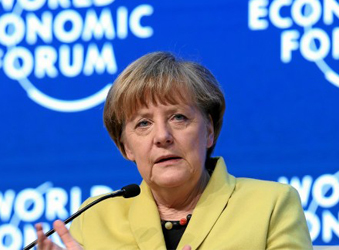Before a phone conversation this week to discuss the war in Syria and Russian nuclear arms, German Chancellor Angela Merkel and U.S. President Donald Trump had not spoken to each other in over five months.
That gap, described by diplomats on both sides of the Atlantic as shockingly long, underscores the challenge Merkel faces if she succeeds in forming a coalition government later this month and, as German officials suggest, tries to reset the relationship with Trump.
A strong believer in close transatlantic ties, Merkel was the go-to leader in Europe for both Presidents Barack Obama and George W. Bush when Washington and Berlin were navigating the global financial crisis, Russia’s annexation of Crimea from Ukraine and Iran’s nuclear programme.
But her relationship with Trump got off to a frosty start and has never recovered.
At a time of rising transatlantic tensions over trade, the Iran nuclear deal and NATO defence spending, some German officials and analysts worry the personal divide between the brash, impulsive president and cautious, analytical chancellor could lead to a further deterioration in bilateral ties.
Jan Techau, a senior fellow at the German Marshall Fund think tank in Berlin, described the five month gap in contact between the leaders before Thursday’s phone conversation as a“very very bad sign”. He saw no connection with the conservative chancellor’s struggle to form a new government more than five months after federal elections.
“I don’t think it has anything to do with the political limbo in Germany. It is a sign of a relationship where there is no trust,” Techau said.“If you don’t have a personal relationship between the leaders to fall back on, it can be very difficult to stop the downward spiral.”
Juergen Hardt, a senior lawmaker in Merkel’s Christian Democrat party, said:“Especially in times of stress, when immediate communication is required, they need to be able to pick up the phone and find solutions. There needs to be a good personal relationship and a good working relationship.”
MACRON
German government officials play down the prolonged“radio silence” between Merkel and Trump, noting that the chancellor has ratcheted back her contacts with many foreign leaders during the months of arduous coalition talks at home.
They say the dialogue between Germany and the United States at lower levels of the government remains strong.
Some question whether any foreign leader can influence Trump, who shocked his European allies again on Thursday by announcing plans to introduce hefty tariffs on imported steel and aluminium, sending financial markets reeling on fears of a trade war. [nL2N1QK0GY]
“Germany needs to make up for the vacuum at the top level by engaging on other levels, with Congress, with the states and with civil society,” said Thomas Matussek, a former German ambassador to the United Nations and Britain.
Still, the contrast between Merkel’s icy start with Trump and the rapport that French President Emmanuel Macron has developed with the American president is stark.
Macron has gone out of his way to woo Trump with a mix of machismo and flattery. The two engaged in a macho handshake contest when they first met last May. Two months later, Macron hosted Trump at Bastille Day celebrations in Paris, dining with him in the Eiffel Tower.
Next month Macron will travel to Washington for the first official state visit by a foreign leader since Trump became president early last year.
Over the past five months, Macron and Trump have spoken by phone seven times, according to the Elysee. Over the same span, British Prime Minister Theresa May has spoken with Trump four times, according to Downing Street.
U.S. and German officials confirmed to Reuters that before Thursday, Merkel had not spoken with Trump since Sept. 28. She often spoke with Obama and Bush on a weekly basis, according to German officials, who could not recall a gap of more than a month with Trump’s two predecessors.
PUBLIC OPINION
A French official close to Macron rejected the notion that the French president and Merkel were engaged in a coordinated“good cop, bad cop” act with Trump, and noted that the chancellor had to take her more sceptical public into account.
“German public opinion towards Trump is a catastrophe. It is much more violent (than in France),” the official said.
A poll by the Pew Research Center last year showed that just 11 percent of Germans have confidence in Trump. Another Pew poll published earlier this week showed that 56 percent of Germans view the relationship with the United States as“bad”.
German officials still expect Merkel — who has continued to talk with Russia’s Vladimir Putin and Turkey’s Tayyip Erdogan during times of acute bilateral tensions — to do her best to re-engage with Trump over the coming months.
The two will see each other at a G7 summit in Canada in June and at a NATO summit in Brussels a month later.
U.S.-German contacts may pick up if Merkel finally forms a new government. Social Democrat party members are voting on whether to endorse another four years of the‘grand coalition’ with the Christian Democrats, with the result of the postal ballot due on Sunday.
“Once there is a new government in place all cabinet members will engage. Expect a new wave of visits from Berlin to Washington,” one senior official said.
But German officials say there are no current plans for Merkel to return to the White House, where Trump ignored entreaties to shake her hand during a meeting in the Oval Office a year ago. And there are no plans for Trump to return to Germany following his visit to Hamburg for a G20 summit last July.
Additional reporting by Michel Rose in Paris, Elizabeth Piper in London and Jeff Mason in Washington; editing by David Stamp
source: Reuters


